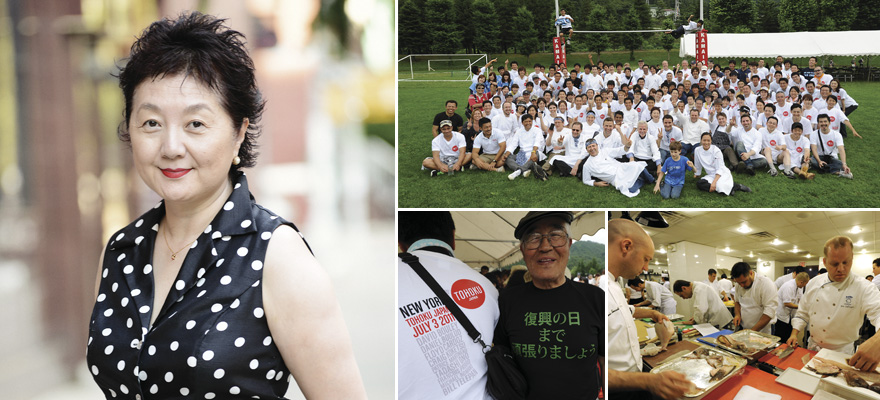Home > Highlighting JAPAN > Highlighting Japan August 2013 > Food Pioneer: Taeko Takigami
Highlighting JAPAN
Japanese Abroad
Food Pioneer
Taeko Takigami

Back in the 1980s, Japanese food was just coming into fashion in the United States. Americans daring enough to try exotic washoku had the choice of savoring sushi or one of the large-brand sakes, but little else. Today, however, tastes have diversified enough that Japanese food is no longer synonymous with sushi, but includes a variety of specialty dishes more commonly eaten in Japan: ramen, donburi, izakaya fare and ji-zake. One person who has made a significant contribution in opening the hearts and minds of the American cuisine world is Ms. Taeko Takigami.
President of Comculture LLC (www.comculture.net) and former Executive Director of the New York-based Gohan Society, Ms. Takigami has an impressive background in promoting culinary culture in the United States. First arriving in California and then moving to New York in the early 1980s, she found that many Americans had an oversimplified perception of Japanese food and thenceforth embarked on a career in educating chefs in the United States about Japanese cuisine and its varied ingredients.
"I grew up in Osaka, which is a city where people love food. Osaka-jin strongly believe that mutual enjoyment of a dish can deepen the relationship among people sitting at the same table. Appreciation of food can bind people together unlike anything else and it is this important cultural trait that probably makes people from Osaka quite warm-hearted overall," Ms. Takigami says.
Beyond the obvious health benefits of eating nutritious Japanese ingredients, the cultural milieu of these dishes, such as formal kaiseki ryori and common ramen, can introduce North Americans to a new world of tastes. As Ms. Takigami explains, "Exposing chefs to the special preparation required for Japanese food not only expands the range of healthy ingredients they can choose for their recipes, but can also help foster the innovative attitude required for inventing new tastes and fusion food. Introducing chefs to the gastronomic delights of Japanese food is more than just good business, it's a mission of cultural exchange of our culinary traditions. It can be a win-win situation."
Food can be an important entry-point into another culture, much as music, movies and languages can stoke passions of other nations. For Ms. Takigami, it has provided her with many opportunities: "To be able to leave a legacy that fuses Japanese and American cultures is a lifelong aim of mine. It is a way to promote and mutually enjoy the best that our societies have to offer. It is more than just a business or industry, but a valuable way to add variety to the passions of life."
Food can also be a bond of sustenance in times of adversity. When the earthquake struck Tohoku in March 2011 leaving many people without homes and food, Ms. Takigami seized the opportunity to mobilize chefs for a humanitarian cause. She helped organize volunteer chefs from the United States – some of the best reputed chefs in the world – to start a rescue kitchen in Kamaishi, Iwate-ken to provide food for the needy. At a time when help was hard to come by and volunteers in short-supply, the presence of a kitchen providing quality dishes to assist rescuers and the displaced was a very welcome and needed gesture of support from abroad in a time of disaster.
Her own company now seeks to educate chefs and clientele about lesser known Japanese ingredients and cooking techniques in the United States. She particularily emphasizes the nutritional drawing-power of washoku, as evidenced by the life-span of the average Japanese person. Beyond a healthy diet of fish and vegetables, washoku staples such as soba and rice are comparatively low in fats, cholesterol and additives and, if prepared the correct way, can offer a healthy alternative to standard American fare. Even street-food in Japan is comparatively nutritious and may hold significant appeal to Americans. Again, education and training are key to ensure that such ingredients are available for chefs to prepare properly.
Ms. Takigami's latest efforts involve extensive contact with top-ranked chefs in New York. By hosting events, seminars and tastings, she aims to influence haute cuisine while perhaps using media to promote chef exchanges. "If we could film a star chef from the West touring Japan, striking out into the countryside to try some local cuisines, it might provide a new context needed to better appreciate Japanese food for its simplicity, sophistication and good-hearted pleasure."
It is through the passion of such food pioneers as Ms. Takigami that the culinary world has widened.
© 2009 Cabinet Office, Government of Japan






